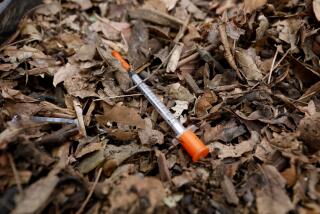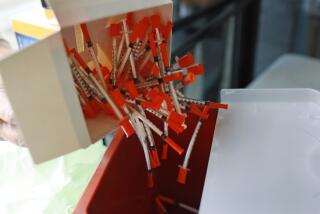Police Losing Patience Over Zurich’s ‘Needle Park’ : Drugs: Proponents say experimental distribution of sterile syringes and needles to combat the spread of diseases is working. Critics say it encourages consumption.
- Share via
ZURICH, Switzerland — Late every afternoon, drug dealers and users throng around a converted public toilet in Platzspitzpark, an experimental open drug market by the scenic Limmat River.
They cook up mixtures of heroin, cocaine and methadone, shooting them into arms, legs, ankles and necks.
It is rush hour in “Needle Park,” and some addicts are already slumped to the ground in a stupor.
For drug users, Platzspitz, a narrow wooded peninsula jutting into the Limmat, is utopia.
But police are starting to lose patience over the park.
They say it is becoming increasingly dangerous and are threatening to withdraw their cooperation with a city policy that permits the open drug scene, provided it is small-scale.
Platzspitz is also the scene of a city project to distribute sterile syringes and needles to combat the spread of AIDS--acquired immune deficiency syndrome--among drug users.
“It is much better here since they started the service,” said a swaying, 21-year-old Yugoslav male prostitute who had just taken his daily cocaine injection.
Critics of the Zurich Intervention Pilot Project (ZIPP), which distributes more than 8,000 syringes and needles a day, as well as about 200 condoms, say the park encourages drug consumption and attracts addicts from all over Europe.
Tales of addicts mugging people by threatening them with possibly AIDS-infected needles are part of city lore. The tabloid newspaper Blick refers to the park as “Zurich’s Drug Hell.”
Police have complained that the city policy means that they are powerless to maintain order in the park. In October, police representatives confronted the city government by calling a news conference and saying the policy should be abandoned.
“The policy of the City Council disturbs us. We can’t have a free hand down there,” the head of the Police Officers’ Assn. said.
“The climate is getting harder and harder down there,” another police spokesman said. “The users and the dealers are getting tougher and officers have been attacked and threatened with needles.”
Police say they seize on average 2.2 pounds of heroin or cocaine a week at the park and are confiscating an increasing number of guns and knives.
Those running the intervention program support the city government in saying the project is the only way to deal effectively with drug addiction and its inherent problem of AIDS.
“We have to live with the drug problem; nobody in the world has been able to eradicate it,” said Peter Grob, a founder of ZIPP.
City Councilman Robert Neukomm said, “The drug problem cannot be solved by tougher police measures, although we certainly need a police presence at Platzspitz. It’s better to have the drug scene concentrated at Platzspitz where we can see it than hidden in the alleys of Zurich.”
Grob, under attack for promoting a permissive drug culture, answered: “What we do here is break the link between drug addiction and the transmission of AIDS.”
Through a window in the converted public toilet, doctors and medical students hand out one sterilized syringe and needle for every used one discarded into a large, blood-spattered vat.
Sterile wipes, creams for damaged veins and, on request, fresh water are also available.
“I prefer to give them clean water than have them go to the Limmat River,” said Regula Haeseli, a ZIPP nurse, as she turned to help a woman who burst into the room bleeding from a broken needle embedded in her arm.
Grob said the project, which is funded by an annual $1.1-million grant from the city, the canton and the federal government, is the cheapest AIDS prevention program available. AIDS, which is transmitted through blood and other bodily fluids, strips the body of its defense against disease.
According to official statistics, by the end of August 12,198 people in Switzerland were AIDS carriers and 1,462 were suffering the full disease.
Of the 2,000 to 2,500 people who visit Platzspitz every day, about one in four are “socially integrated” people with regular jobs, Grob said.
About 500 are hard-core cases who virtually live at Platzspitz, he added.
“The addicts are not dangerous,” Grob said.
A party of schoolchildren walked by and stared at a junkie who collapsed. He began to shake uncontrollably.
A ZIPP doctor came running, donned surgical gloves and revived him with oxygen.
“This happens almost every day because of the cocktails they mix,” Grob said. “Luckily we catch most of them before it’s too late.”
More to Read
Sign up for Essential California
The most important California stories and recommendations in your inbox every morning.
You may occasionally receive promotional content from the Los Angeles Times.













